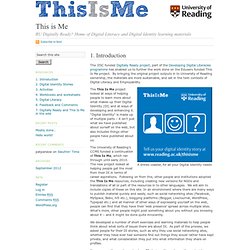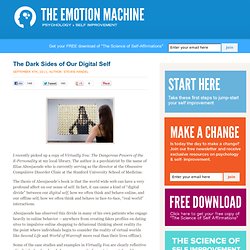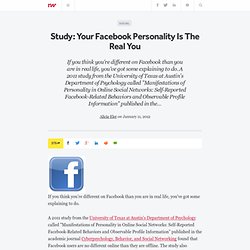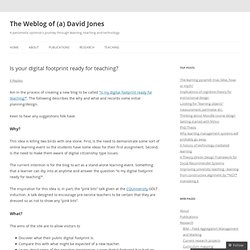

This Is Me: This Is Me Introduction. The JISC funded Digitally Ready project, part of the Developing Digital Literacies programme has enabled us to further the work done on the Eduserv funded This Is Me project.

By bringing the original project outputs in to University of Reading ownership, the materials are more sustainable, and set in the twin contexts of Digital Literacy and Employability. A drinks coaster, for all your Digital Identity needs The This Is Me project looked at ways of helping people to learn more about what makes up their Digital Identity (DI) and at ways of developing and enhancing it. “Digital Identity” is made up of multiple parts – it isn’t just what we have published about ourself on the web, but also includes things other people have published about us.
The University of Reading’s CCMS funded a continuation of This Is Me, which ran through until early 2010. We developed a number of short exercises and learning materials to help people think about what sorts of issues there are about DI. Please Note: A Collection of Digital Citizenship Resources. The Dark Sides of Our Digital Self. I recently picked up a copy of Virtually You: The Dangerous Powers of the E-Personality at my local library.

The author is a psychiatrist by the name of Elias Aboujaoude who is currently serving as the director at the Obsessive Compulsive Disorder Clinic at the Stanford University School of Medicine. The thesis of Aboujaoude’s book is that the world wide web can have a very profound affect on our sense of self. In fact, it can cause a kind of “digital divide” between our digital self, how we often think and behave online, and our offline self, how we often think and behave in face-to-face, “real world” interactions. Some of the case studies and examples in Virtually You are clearly reflective of individuals who already have a propensity for certain mental problems. The internet just provided an outlet that exacerbated the problem, and clearly not everyone who engages in online behavior is going to develop these mental problems. Delusions of Grandeur Narcissism Aggression.
Study: Your Facebook Personality Is The Real You. If you think you're different on Facebook than you are in real life, you've got some explaining to do.

A 2011 study from the University of Texas at Austin's Department of Psychology called "Manifestations of Personality in Online Social Networks: Self-Reported Facebook-Related Behaviors and Observable Profile Information" published in the academic journal Cyberpsychology, Behavior, and Social Networking found that Facebook users are no different online than they are offline. The study also revealed strong connections between real personality and Facebook-related behavior. Social and personality processes, the study says, accurately mirror non-virtual environments. Looking at the big five personality traits - openness, conscientiousness, extraversion, agreeableness and neuroticism - Professor Samuel D. Gosling and his colleagues found that self-reported personality traits are accurately reflected in online social networks such as Facebook.
Is your digital footprint ready for teaching. Am in the process of creating a new blog to be called “Is my digital footprint ready for teaching?”.

The following describes the why and what and records some initial planning/design. Keen to hear any suggestions folk have. Why? This idea is killing two birds with one stone. First, is the need to demonstrate some sort of online learning event so the students have some ideas for their first assignment. The current intention is for the blog to act as a stand-alone learning event. The inspiration for this idea is, in part, the “pink bits” talk given at the CQUniversity GDLT induction. What? The aims of the site are to allow visitors to Discover what their public digital footprint is.
In general, I shouldn’t be creating lots of content on this site. Looking for resources/activities George Couros’ page on digital footprint. Via Doug Pete’s about page is Visual.ly infographic generated based on my Twitter activity. Nice video from one of Michael Wesch’s students And the obligatory US news story Sites. Digitalcitizenship. Digitalcitizenship. Digitalcitizenship. Digital Tattoo.